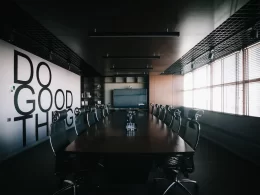When considering a change, or taking a new job at all, you have to take into account the fact that the employer will expect you to provide him with certain documents confirming the qualifications you have acquired and the experience you have gained. It will be necessary to prepare a resume, and sometimes a cover letter is also a good option, in which we will include information that may influence the recruiter’s decision. When all goes well, you will be invited to an interview, where you will usually be asked a few questions. What can be expected? What are the most common questions during a job interview?
A job interview can be stressful
Getting ready for a “job interview” literally eats up stress for many people. And it’s not surprising. New surroundings, new people, perhaps an unusually good salary that would allow us to change our financial situation a bit. All these factors make the job interview one of the more stressful moments for all of us. However, there are ways to partially reduce the tension, which include getting to know the employer, his contractors, history, but also to properly prepare for questions that are quite often predictable.
Let us recall at this point, for example, tests or classes at school. The better we prepared for them, the more time and attention we devoted to studying, the less excitement accompanied each exam. It is no different with a job interview. The better we get to know our new employer, the more time we spend preparing, the smoother the interview itself will be, and the results can be strongly satisfactory. In the age of the Internet, a provider of information about everyone and everything, doing some reaserch shouldn’t pose much of a challenge, and can make a difference in the interview process.
The same is true of the questions themselves, the answers to which can determine whether you get the job you are interested in. And these really are quite often the same in different workplaces, and for some of them we can prepare a kind of “ready-made”.
Common interview questions
In line with what we wrote above, interview questions are extremely often repeated in different workplaces, companies or corporations. This is due to the fact that behind most of them are sociologists and psychologists, who have arranged certain patterns that allow us to know the character traits of a person.

Motivation
An extremely important issue for any employer is what drives a person applying for a position. We can expect that the recruiter will pay a lot of attention to this, and will want to know why we are applying for a position with this particular company.
Don’t miss out! Gap year. Is it worth taking a break in life?
The motivation question can be arranged in any way, and examples include.
- Why are you applying for a particular job at our company
- Why are you applying for this position?
- Why should we take you on?
- What is the reason why you want to change jobs and take up employment with us?
Candidate’s characteristics and previous experience
Every job interview usually involves questions about a person’s qualities, strengths and weaknesses, as well as acquired experience. Some examples of questions related to these are presented below.
- Please tell something about yourself in a few sentences.
- What is your greatest asset. Please name one strong characteristic.
- What are your weaknesses?
- What do you dislike about yourself or what would you like to change in your character traits?
- What is your greatest professional achievement?
- Do you remember the biggest professional challenge that you have managed to overcome recently?
Professional goals
The next set of questions that may come up in an interview will undoubtedly be about your career goal. An HR professional wants to know whether he or she is dealing with an ambitious person focused on continued growth and career development, or, however, someone who will only pick up the tab. Examples of questions about career goals include:
- Where do you see yourself in 5-10 years?
- What is your dream job?
- What do you expect from your employer?
- What do you expect from this position?
Finance and knowledge of the company
Practically no job interview will be without the topic of finances. This allows the recruiter to see what expectations the candidate has for the position, while also ascertaining what motivates him and what his ambitions are. The situation is similar when it comes to knowing the company. For an HR professional, this can really matter, as it helps determine whether the prospective employee has put in the effort to prepare for the interview, and thus how serious he is about taking the job. Some examples of related questions below.
- What are your financial expectations?
- How much do you want to earn in this position?
- What do you know about our company?
Body language and general attitude
A very important element of any job interview is body language, that is, how the candidate for the position behaves and what he or she is able to convey to the HR professional in this way. Among other things, he or she will pay attention to whether we look him or her in the eyes, whether we jump from foot to foot or how our hands are positioned, and whether we listen at all. All of this affects our personal image.
In addition, we can expect questions like:
- Do you have any questions for me?
- What would you like to know before you start working for our company?
A job interview can be a big challenge, but – as we mentioned in the introduction – proper preparation for it will allow us to significantly reduce tension, and consequently improve our body language.




